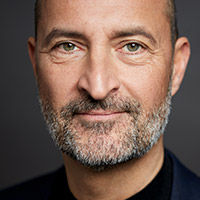
Marco Thelen and Marcel Derakhchan discuss the leadership roles and qualities that are relevant in this context. Why mastering complexity is the greatest source of psychological stress and strain and how companies should counteract it with new team structures are described in the first part of this dla perspective. Part 1
dla: Recently we came across a study that interviewed 1,000 top managers on the topic of digital transformation. More than one respondent in two viewed their transformation program to date as a “waste of time”. Is quiet resistance the real challenge?
Yes, and no. Yes, because without the genuine and personal commitment of the management team little is going to change, and certainly not for the better. And no, as I take a critical view of such raw assertions – that could also mean that the other half has had quite the opposite experience. Putting a different slant on it is much more interesting in my view: more than one in two respondents do not understand that transformation programs do not work to a standard recipe of “planning, rubber-stamping, accomplishing, rubber-stamping”.
dla: Transformation service to order …
Marcel Derakhchan: There is no such thing. But the need for it most certainly determines the mentality of many organizations. For good reason: a framework for action of this kind provided security for many years – someone takes responsibility for things going to plan. And thinking in five-year cycles also works very well – it’s just that it’s been a decade since this has been possible. I can only afford this kind of failsafe today if I completely dominate a market. As a manager, I should be able to decide whether a mentality of this kind is still in keeping with the times.
“All that remains is the hard leap into a new world fixated on transparency.”
Marco Thelen: Marco Thelen: Absolutely. There is, however, another important point: Today we have a situation where work no longer functions as it used to, at least not if there is pressure to change. There is also no soft transition from this way of working to a new way. What we are left with is quite simply the hard leap into a new world fixated on transparency. Transparency on the outcome of work, on the mistakes, and on the sincerity of action. Operating at such a high level of transparency naturally takes up a great deal of time and is taxing for managers. It requires a personal approach to work that is not fueled by career ambitions and salary aspirations.
dla: How to bear the load? What do successful “transformation leaders” do right?
Marco Thelen: There are a number of approaches here. A frequent common denominator is that a manager can reflect his role and quality as a communicator – through an awareness of the whys and wherefores of sending personal signals within the meaning of commitment, of conveying passion openly, of giving transparent meaning to what they do so that it makes sense to others as well. This is what inspires people, though the capacity for empathetic listening is naturally also important. All combined with a clear perception of how an organization must be understood, namely as a living organism, and how it must actually work and function.
dla: A mixture of motivational guru and feelgood boss?
Marco Thelen: No, absolutely not. Sharing responsibility and displaying confidence also mean being able to deal with transparency. Transparency also signifies security in the sense of others expectations of one’s own actions. This concerns each individual team member. Let us take the topic of “co-creation” as an example – a term that I do not understand from a bottom-up perspective. Leadership still means being the person who is ultimately responsible for what happens. It’s not about consulting everyone and attaching the same importance to each opinion. However, allowing opinions, understanding them and putting them in the right context is a must. To do this, one needs to read the context of organization units correctly – of teams, and sometimes of individuals – with the aim of communicating in a way they can buy into and then leading them in the direction of a shared vision and common values.
“Leadership still means taking final responsibility for what happens.”
dla: Mr Derakhchan, what is your observation here from having worked together with managers at board level? Is this what they want? And can they deliver?
Marcel Derakhchan: It’s not possible to generalize. In the final analysis, this also depends on the communication type and how one has developed over time in this respect. Communication qualities are a linchpin in the transformation process, that I agree with. They were never unimportant to management, but the emphasis now placed on them is new.
When the issue is tackling change I often make another very interesting observation, particularly when comparing first liners and early Gen Y management initiates. Much of what we are discussing here has been taken on board by those in charge. But currently, many are now in a phase of life on the other side of 50 and socialized. They have a hard time with change, but feel the necessity of taking action.
dla: And what happens then?
Marcel Derakhchan: Some are better at it than others. The first retires to a monastery while the second takes to mountain climbing. Number three retreats into himself, while four throws in the towel. Number five just carries on as before. But with the exception of number four, the general underlying tenor is entrepreneurship, knuckling down and taking action – also or simply because the journey goes into the unknown …
dla: Does this resonate with the goals of the younger generation, our up-and-coming managers?
Marcel Derakhchan: Sadly, not often. Here I experience a great deal of conformity. The focus on me, myself and I is huge, and going the extra mile? Only if I can fit it into my 40 hours. Here I see a clash between the demands of leadership and the demands the individual employees place on themselves. Actually, I am relatively content with things the way they are. This is most interesting to me as it produces tension that will ultimately cause rupture at one end or another.
I see a clash between the demands of leadership and the demands the individual employees place on themselves.”
dla: Are there Old Economy top managers who set an example by integrating the various different facets of transformation, technological, cultural and strategic?
Marco Thelen: Daimler’s Dieter Zetsche who was mentioned at the start is clearly one of those people. He definitely does not have digital native credentials – and he most assuredly had to carve out his career in an environment where self-motivation was not sufficient to drive the organization forward. As far as leadership is concerned – in tune with the nature of an engineer – by always applying right and wrong criteria to each decision. This in itself is an interesting utopia: to believe that one can take the right decisions. One may perhaps make decisions that are better or worse. But right and wrong? No idea what that’s supposed to look like …
“The belief that one can make the right decisions is an interesting utopia.”
dla: What precisely did Dieter Zetsche do better?
At a late stage in his career, far beyond the age of 50, he succeeded in reinventing himself. For instance, he did a walk-through of the company and organized “FuckUp Nights”. He explained to his employees what his worst decisions were and what prompted them. This was living transparency and empathy – but not under the slogan of “I was too dumb,” or “the fault lies elsewhere”.
Instead, what resulted was an exceptionally good explanation of how external pressure, also pressure falsely perceived, expectations wrongly understood, and personal ambition can mix a toxic cocktail that is very conducive to the risk of a poor decision. If I share all this as a manager I am helping others not to fall into the same trap.

Marco Thelen, Senior Partner bei Roland Berger, fokussiert sich in der Beratung auf die Bereiche Digital Strategy, Service Innovation, Digital Transformation Design und Execution sowie Cultural Change. Er unterstützt seine Kunden, komplexe Transformationen erfolgreich zu bewältigen: von der Formulierung einer Digitalstrategie, dem organisatorischen und technologischen Umsetzungsdesign bis zur Etablierung wirksamer Governance-Strukturen und Reporting-Modelle.
Marcel Ramin Derakhchan ist bei dla digital leaders advisory verantwortlich für die Besetzung von Top-Managementfunktionen in Business & Professional Services Unternehmen sowie Software- und Hochtechnologieunternehmen. Sein Spezialgebiet sind komplexe Suchmandate, die einen interdisziplinären Ansatz aus Search, Organisationsberatung und individuellem Coaching erfordern.

More information: Study Celonis 2019
